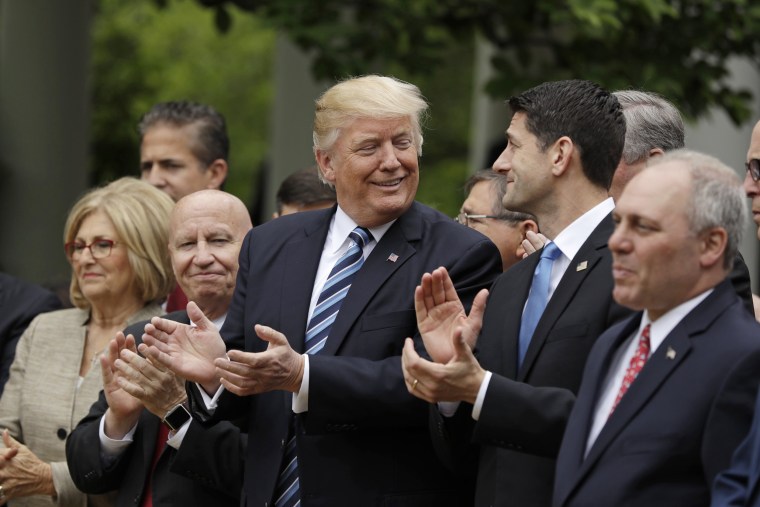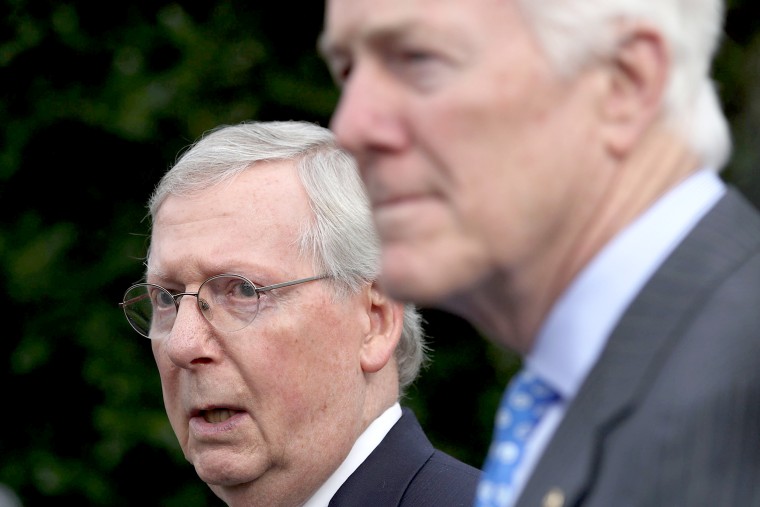WASHINGTON — When Congress returns to work Monday, Senate Republicans will press forward with their attempt to reform the nation's health care system, an effort that has been hampered for months by internal divisions and an ineffective and inconsistent public relations push.
Low approval ratings have plagued the GOP's health care bill throughout the party's effort to dismantle the Affordable Care Act. The reasons: A secretive process that ignored public input, a disengaged president who hasn't energized his base, and the task of selling a bill its own party can't get behind.
The Senate will get to work again this week to settle differences over the legislation, called the Better Care Reconciliation Act, with the goal of holding a vote next week. Senate Majority Leader Mitch McConnell was forced to postpone a vote he had planned to hold before the July 4th recess due to a lack of votes.
Selling it is unlikely to get any easier after many members of Congress spent the past week in their home states, listening to — and in some cases avoiding — voters who have concerns about the legislation.
Polls show that the party's ideas about reform are only growing more unpopular over time. When the House of Representatives passed its bill, the American Health Care Act, in early May, public support for the measure was 23 percent in the NBC News/Wall Street Journal poll.
Last month, the same poll found that just 16 percent of respondents supported the GOP plan.
Michael Steel, former spokesman to former House Speaker John Boehner, said it has been difficult for Republicans to transition from the opposition party to one trying to implement a seven-year long campaign promise that focused more on the repeal part than the replace.
“After years of being focused on opposition to Obamacare and its failures, a lot of Republicans are rusty when it comes to making the case for conservative health care reform,” said Steel.
Related: Poll: 48 Percent Say House GOP Health Care Bill Is a Bad Idea
And Republicans have been undercutting their own efforts.
When the House passed its bill, which makes cuts to Medicaid, lowers tax credits to help purchase insurance and undermines protections for people with pre-existing conditions, Republican senators declared it dead on arrival.
And the biggest public-relations asset Republicans have — President Donald Trump and his bully pulpit — has been an ineffective and inconsistent communicator on the issue. His focus has usually been elsewhere and when he has discussed health care, his message has been contradictory.
Trump often boasts that the GOP health care plan will provide “better” care and will be “great," but discussion of any details is sparse. He held a news conference in the Rose Garden celebrating the House passage of the bill, but in a subsequent meeting with senators, he called the House version “mean.”
And no other Republican has stepped up to be the lead cheerleader for the measure.
“The biggest problem is there are very few champions of the Republican proposals,” said Alex Conant, a former spokesman for Sen. Marco Rubio, R-Fla.
The president has yet to give a public speech devoted to health care, and he has not been particularly focused on it in his other forms of communication with the public. Of his numerous emails to supporters, not one has urged support for the health care legislation or encouraged people to put pressure on their senators to support it.
“The conservative senators who currently don’t support the legislation will be never be inclined to support it if they don’t feel pressure from Trump’s base, and only Trump can rev up his own base,” Conant said.
Of his last 70 tweets since the Senate decided to postpone its vote on health care, Trump tweeted only four times about health care. And in one of those instances, he undercut the current Senate effort by promoting an idea to simply repeal the ACA and replace it at a later date, a strategy he has opposed in the past. During that same period, however, the president has tweeted 18 times criticizing the media.
"You can’t keep him focused," Republican political strategist Reed Galen said about Trump's performance on the issue, adding that even "if he is focused he might say the wrong thing." And even when he is on message, "you never know what his political arm might do," Galen said.
Giving little reassurance to skittish members of Congress, a pro-Trump campaign group, America First Policies, started running political ads against one of the most vulnerable Republican senators, Dean Heller of Nevada, who is up for re-election in 2018. Heller is one of several GOP senators who have said they can't support the bill in its current form.

The policy disagreements between moderates and conservatives have served to dampen public support for the bill. “You don’t see a lot of senators talking about why it’s a great bill,” said Conant.
Speed and secrecy have also hampered efforts to convince the public. The House bill was passed in early May, just a few months into the new Congress, with no public hearings and little debate. In the Senate, McConnell crafted a bill without hearings or public input, keeping even key stakeholders in the dark.
Interest groups, including the American Medical Association, AARP and nearly every other health care group, have come out in opposition to the bill. The trade group for the health insurance industry refused to enthusiastically endorse the measure.
Even if the GOP does begin to focus its public pitch on health care, its members are working against larger forces. With the passage of Obamacare, Democrats changed the terms of the debate. Republicans are now forced to operate in the framework of expanded care and are finding it difficult to roll back benefits that millions of people have or could get.
Steel argues that there are good things about the GOP bill, including the elimination of mandates that require people to purchase insurance and a repeal of taxes. But those elements have not broken through the noise of intense opposition by people worried about losing access to Medicaid or insurance.
“I think the party in general has never been great at making the case for conservative health care reforms and the benefits they would bring,” Steel said.

